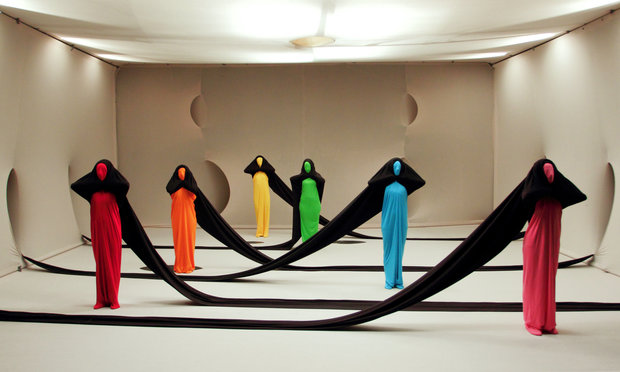For theater-goers and art enthusiasts, Fajr International Theater Festival is always a golden opportunity to get a taste of theater worldwide. Now in its 34th year, and with quite a long-time experience, the FITF has invited artists from around the world including Japan, Hungary, France, Belgium, Spain, and Germany to present their best stage productions to Iranian audience. One of these plays was the Hungarian production ‘Becoming Butterfly’, a visual arts performance written and directed by Zsófia Bérczi.
For long the theater has faithfully served the traditions and customs of a well-made play, with sharp outlines and distinct features that make everything easy to grasp and comprehend. The tradition has at times sunk in too deep that the audience would feel apprehensive if the performance was to break away from the familiar norms and bring to stage something with blurred and blending lines, notions that would escape traditional definitions and challenge the very foundation of old, deep-seated expectations.
'Becoming Butterfly' is as much a huge leap from tradition as it could get. And not just for Iranian theater-goers the majority of whom still preferring the old ways and the up-front presentation of realities and the daily life, but also for the Hungarian theater tradition as well. Ms. Bérczi believes her performance is quite unique in Hungary and even across Europe. Her delving into visual arts and abandoning all previously-held and respected theater traditions is a great risk into the right direction.

“The Hungarian theater tradition likes to deal with realism mixed with cynicism. The majority of plays in Hungary are social critiques, as artists would rather show the real life with a look of cynicism,” says Ms. Bérczi, “but I personally try to steer clear of political issues and instead present topics on human and environment.”
What makes 'Becoming Butterfly' a masterful performance of art and delight is the harmony interwoven subtly with the plot, the movements of the actor and the actresses, the music and the shifting lights on the crème walls surrounding the play.
The play commands all your senses and provokes your imagination. The actors covered head to toe in elastic textiles morph into different shapes, a worm, a tree, an elephant, a whale, and set your imagination reeling. The play also featured commentary in Hungarian with a Persian voice-over, but it could have also done without it. There was something universal and deep about the play that made it connect with the audience no matter from which country and culture. The concept of the human soul can be grasped by every one of us, as well as our deep-seated desire to move beyond the limits and confinement of our physical bodies toward achieving perfection and freedom. Human beings are always on the cusp of evolving, but so are all other creations, as the play demonstrates. The yearning for reaching a better state of existence is as much potent in an earthworm as is in a human. And it is exactly this very yearning that connects all sentient beings to one another. “Human beings are not the most beautiful creation on earth, but they are the most beautiful dream of all creations on earth.” This was one of the most powerful lines in the performance that resonated deeply with the audience. It was like a bright light shining down on our perceptions and fears. It made taking great risks and tackling challenges seem much easier. It allowed us to believe in the therapeutic impact of metamorphosis, in resurrection and the idea of ongoing sentience in the face of death. There is no death, but a transitional stage. Death is but evolution. “One must decide to go through the hardship of pupating as this is the prerequisite flying.”
“I chose this play to stage for the Iranian audience as this was the most visual performance that we had. It had the most images, and also I was conscious about the particular way of clothing not only in Iran but in the East,” Ms. Bérczi said while referring to the covering of her actresses in the elastic textiles.
“I always wanted to make a performance that is far from human beings, to create another world so different from the one we are living in, but later I realized that this is not quite possible as we are humans and cannot talk about something totally different,” explained Ms. Bérczi about her reason for putting her performers into the elastic textiles, “that’s why I decided to make something about the human soul, instead. Inside these elastic textiles, the human can morph into different shapes which are all various representations of the human soul.”
“Having been invited to Fajr Theater Festival is one of the most important events of my life. The other one was that we celebrated the 10th birthday anniversary of 'Becoming Butterfly' on the Iranian stage,” said Ms. Bérczi, while noting that her play has so far been staged in Germany, Armenia, France, Romania, Italy and several other countries.
“But this is my first time in Iran,” she said, “and also the first time 'Becoming Butterfly' has participated in an international theater festival.”
“In my opinion, most directors try to present the ugliness through a critical eye so as to guide the world toward goodness,” said Ms. Bérczi, “but in 'Becoming Butterfly', we focused our attempts on presenting the beauties only.”
And she beautifully succeeded. 'Becoming Butterfly' is a brilliant journey through different stages of evolution on the wings of music, body movements and dancing lights.
You can watch part of the play here.
Zsófia Bérczi was born in 1976, Budapest, Hungary. She studied multimedia art at University of Art and Design Budapest and is currently the founding member and chairman at Living Picture Visual Theatre and Association (2004). She has also directed other plays including “Living Surface”, “Octopus Tarot Labyrinth”, “Living Morphology”, “Morpholand”, “JiChing Labyrinth”, “Light Spheres”, “Wave Space”, “The Carpet”, etc.
